 |
||||||||||||||
|
||||||||||||||
 |
||
|
 |
||||||||||||||||||||||||
|
||||||||||||||||||||||||
 |
||||||
|
||||||
 |
|||||||||
|
 |
||||||||||||||||||
|
||||||||||||||||||
 |
|||||||||||||||||||||
|
|||||||||||||||||||||
 |
||||||||||||||||||
|
||||||||||||||||||
|
|
||
|

|
||
 |
The 2,531st CyberAlert. Tracking Liberal Media Bias Since 1996
6:45am EST, Tuesday November 20, 2007 (Vol. Twelve; No. 204)
|
2. Oops! Ex-ABCer: I Accidentally Endorsed Hillary for President
3. ABC Gushes Over Hillary: She 'Simplified' Her Immigration Stand
4. CNN Hits Democrats from the Right on Immigration, Schools, Iraq
5. Washington Post Prints Brief Book Review of MRC's 'Whitewash'
Both networks linked their stories to Canada's top court rejecting asylum for two U.S. Army deserters. On NBC, a deserter living in Canada asserted: "The whole reason we're here is because this was a bogus war. There were no weapons of mass destruction. There were no links to international terrorism." CBS featured another deserter who rationalized: "If I had been asked to go to Afghanistan, I would have gone there. But the Iraq War, I didn't want to have any part of that anymore." [This item was posted Monday night on the MRC's blog, NewsBusters.org: newsbusters.org ] An Army Times story by William H. McMichael, first posted Thursday night, reported: ....At the same time, desertions fell in two of the other three services. A total of 1,036 Marines walked away last fiscal year, marking a three-year decline. Navy desertions -- 1,129 during the 12 months ending Sept. 30 -- fell for the seventh straight year. And a mere 16 airmen left the Air Force for more than 30 days, the time a service member must be absent without leave before being declared a deserter. In the Army's defense, however, [Roy] Wallace [Director of plans and resources for Army personnel] said the percentage of the force that deserted last fiscal year was nearly identical to the fiscal 2001 figure -- indicating that the newer figure, produced under more stress, is actually somewhat of an improvement. "We're comparing a wartime footing with a peacetime footing," he said. "The Army was not in combat in [fiscal] 2001." And while desertions are up, the first-term attrition rate -- which includes desertions -- has dropped from 18.1 percent in April 2005 to 7.2 percent today.... For the Army Times article in full: www.armytimes.com A Friday AP dispatch, by By Lolita C. Baldor, pointed out how desertion rates rose in the 1990s, and provided specific numbers on Marine Corps desertions: ....Army desertion rates have fluctuated since the Vietnam War -- when they peaked at 5 percent. In the 1970s they hovered between 1 and 3 percent, which is up to three out of every 100 soldiers. Those rates plunged in the 1980s and early 1990s to between 2 and 3 out of every 1,000 soldiers. Desertions began to creep up in the late 1990s into the turn of the century, when the U.S. conducted an air war in Kosovo and later sent peacekeeping troops there. The numbers declined in 2003 and 2004, in the early years of the Iraq war, but then began to increase steadily. In contrast, the Navy has seen a steady decline in deserters since 2001, going from 3,665 that year to 1,129 in 2007. The Marine Corps, meanwhile, has seen the number of deserters stay fairly stable over that timeframe -- with about 1,000 deserters a year. During 2003 and 2004 -- the first two years of the Iraq war -- the number of deserters fell to 877 and 744, respectively. The Air Force can tout the fewest number of deserters -- with no more than 56 bolting in each of the past five years. The low was in fiscal 2007, with just 16 deserters.... For the AP story in full: news.yahoo.com The MRC's Brad Wilmouth provided transcripts of the November 16 stories: # NBC Nightly News:
JIM MIKLASZEWSKI: Oddly enough, Brian, in the first two years of the Iraq War, the number of U.S. Army desertions actually declined. But the dramatic spike in desertions over this past year appears to be linked to the multiple combat tours in Iraq. It's the highest number of Army desertions during the entire Iraq War. Army figures released today show that over the past year, 4,698 soldiers were declared deserters. That's an alarming increase of 42 percent over the previous year, but a stunning 80 percent jump in desertions compared to the first year of fighting. As they did during the Vietnam War, many deserters flee to Canada to avoid a military court-martial in the U.S. After six months in Iraq, Private First Class Joshua Key fled to Saskatchewan with his wife and two sons.
KATIE COURIC: Canada's supreme court today denied refugee status to a couple of soldiers who deserted the U.S. Army. By one estimate, 300 American deserters may be hiding in Canada, and they're just part of a growing problem for the U.S. Army. David Martin reports now from the Pentagon.
DAVID MARTIN: Desertions from the Army are up dramatically -- 4,698 soldiers deserted in the last fiscal year, a sharp 42 percent increase from the year before. It doesn't take a wild guess to figure out why. 
Schworm contacted several media experts for comment, including Simpson's former ABC News colleague Bob Zelnick and the Media Research Center Vice President Brent Baker. Both said that Simpson's endorsement of the liberal Clinton was less than a complete surprise. "People had always assumed she was a liberal when she was at ABC, but this confirms it," said Baker. "Those familiar with her work probably had very little doubt she stood on the liberal side of the field," Zelnick agreed. [This item, by Rich Noyes, was posted Monday afternoon on the MRC's blog, NewsBusters.org: newsbusters.org ] Indeed, back in January 2001 when she still worked as a supposedly objective news anchor, Simpson posted a gushing online tribute headlined "Long Live Hillary." Reacting to Clinton becoming a U.S. Senator, Simpson tingled: What an exhilarating moment it must have been for her -- the first First Lady in history to be elected to public office. There, for all the nay-sayers to see, was the woman who had finally come into her own, free at last to be smart, outspoken, independent, and provocative, all qualities she had been forced as First Lady, to "hide under a bushel." Still she was voted one of America's most admired woman. Just wait. You ain't seen nothin' yet. See: www.mrc.org The October 18 CyberAlert item, "Hillary-Backing Carole Simpson Just as Liberal at ABC News," recounted: Endorsing Hillary Clinton for President at a Tuesday night rally in New Hampshire, former ABC News anchor/reporter Carole Simpson exclaimed, an NBC News blog reported, that "it's very freeing now that I'm not a journalist, that I'm able to speak my own mind." But Simpson hardly hid her liberal political views during her years at ABC. "Long Live Hillary" read the headline over an online tribute from Simpson, then anchor of World News Tonight/Sunday, following Clinton's 2000 senatorial victory. At about the same time, she denounced Clarence Thomas as the "cruelest" Supreme Court justice "because he has consistently voted against human rights." If Bush names more like him, she groused, "God help us." The 1994 GOP congressional victories upset her: "I would like to think that the American people care about poor people, about sick people, about homeless people, and about poor children. I am shocked by the new mean-spiritedness." Most infamously, in a 1999 interview with President Bill Clinton at an Arkansas tomato processing plant, Simpson made the story all about herself and her glory: "I have to bask in this moment, for a moment, because I am here talking to the most powerful man on the planet, who was a poor boy from Arkansas....I am an African-American woman, grew up working class on the south side of Chicago, and this is a pretty special moment for me to be here talking to you. How does it feel talking to me? That I made it, too, when people said I wouldn't be able to?" Clinton: "It's a great country." For the CyberAlert in full: www.mrc.org For video of Simpson boasting to Clinton: newsbusters.org Here's an excerpt from Schworm's November 19 article, "Professor takes heat for nod to Clinton," in which Simpson says she will stop teaching her journalism course if she decides to hit the campaign trail on behalf of her heroine: "I know I made a mistake. It was definitely the wrong venue for my first foray into free speech," Simpson said. "But I'd really like to see her win. After being a reporter for so many years, where you wish you could do more than you can, it would be nice to make a difference." Simpson described Clinton, whom she covered extensively during President Bill Clinton's administration, as the smartest woman she had ever met. Simpson took her 14-student journalism class, "Road to the White House," to the rally to show students how to cover a political event, and possibly introduce them to the Democratic front-runner. Instead, Simpson, who is best known as the first woman to moderate a presidential debate, found herself professing her preference for Clinton as the first female president. As Clinton was fielding questions from the audience, Simpson tried several times to get her attention, shouting "Senator Clinton!" across the crowded room. When she finally caught Clinton's eye, she offered an off-the-cuff endorsement that took both parties aback. "I want to tell you tonight, because I happen to be here with my students, that I endorse you for president of the United States," she said. "It's very freeing now that I'm not a journalist and I can speak my mind, and I wanted you to know I think you are the woman, and I think this is the time." Simpson said she immediately recognized her actions were unwise, and believes she has lost a measure of respect among her colleagues as a result. ... Jerry Lanson, an Emerson journalism professor who co-teaches the course with Simpson, said he immediately told Simpson her actions were inappropriate. "As faculty members if we're teaching journalists, we need to model the behavior we're teaching in the classroom," he said. Janet Kolodzy, acting chairwoman of Emerson's Department of Journalism, said she was startled by the endorsement, but felt it was within ethical bounds. "The presence of her students is what raised concerns," she said. "But we are a college that advocates free expression." Kolodzy said the event has sparked discussion on campus on the "gray area between the rights of a private citizen and a journalist's responsibility." Other media observers saw the issue in starker terms. Brent Baker, vice president of the Media Research Center, a conservative media watchdog group, said Simpson's endorsement shows the liberal dominance of the mainstream media. "People had always assumed she was a liberal when she was at ABC, but this confirms it," he said. ... Robert Zelnick, a Boston University journalism professor who also worked at ABC News, said professors are not inhibited from voicing their political opinions, and that Simpson's endorsement of Clinton was fairly predictable. "Those familiar with her work probably had very little doubt she stood on the liberal side of the field," he said. Simpson said her endorsement not only was unplanned, it was caused by a lack of planning. "I'm trying to show them persistence as a reporter, so I kept trying to get her attention," she recalled with a chuckle. "When I did, I realized I didn't have anything to say. I felt like a deer in headlights." END of Excerpt For the Globe story in full: www.boston.com 
"Simplified" is one way to describe the Senator's change of heart. A less friendly variation, one that might be handed to a Republican, is that she flip-flopped. On November 1, the Boston Globe reported: "Hillary Clinton came out yesterday in support of a plan by Governor Eliot Spitzer of New York to offer limited driver's licenses to illegal immigrants..." So, on November 1, she was for the program. She's now against it and that's simplifying a position? This Week host George Stephanopoulos, a former Bill Clinton operative, appeared on GMA to gush that the headline from the debate is "Hillary's back." He enthused, "And the subhead, I guess, would be 'no more Madam Nice Guy.'" For entire article on Clinton's original illegal alien position, see: www.boston.com [This item, by Scott Whitlock, was posted Friday afternoon on the MRC's blog, NewsBusters.org: newsbusters.org ] If the ABC host's comments sound like talking points straight out of the Clinton campaign, viewers shouldn't be too surprised. After all, during an appearance in late September, Stephanopoulos bragged that Hillary's campaign started sending him e-mails after the Senator made a clever debate quip. See the September 28 CyberAlert, "Stephanopoulos Touts Talking Points Sent Him by Clinton Camp," online at: www.mrc.org Reporter Snow also has a reputation as a Clinton booster. On Friday's program, she marveled at how the Senator "hit back" at her opponent's charges. After playing several attacks on the front-runner, Snow asserted that the debate then "shifted to issues." This is the same Kate Snow who defended Clinton's now famous laugh by suggesting that the cackle is either a an example of someone having a great time or "she's the master of a shrewd political skill, disarming her critics with a gleam in her eye and a roar straight from the belly." Check the October 2 CybberAlert, "ABC Leaps to Defend the Laughter of Fun-Loving Hillary Clinton," online at: www.mrc.org A transcript of the segment, which aired at 7:02am on November 16:
DIANE SAWYER: And we go to the race to '08. 47 days now until the first vote. Last night's fiery presidential Democratic presidential debate in Las Vegas. Front-runner Senator Hillary Clinton taking some punches and delivering some back. And "Good morning America" weekend anchor Kate Snow has the highlights.
SAWYER: And our thanks to Kate Snow. What is the bottom line from the debate? What happened in Nevada? Or is it Nevada? Just a few minutes ago, I spoke to ABC's chief Washington correspondent, host of "This Week," George Stephanopoulos. All right, George, good to see you. So what's the headline from last night? 
Campbell Brown directed the first such question to Barack Obama: "Senator Obama, I want to ask you about immigration....What do you say to those Americans who say they are losing out because you would give benefits to people who broke the laws of this country, who came here illegally. And then more generally, as president, where do you draw the line when it comes to benefits for illegal immigrants?" [This item, by Matthew Balan, was posted Friday afternoon on the MRC's blog, NewsBusters.org: newsbusters.org ] Even after a similar question in the last debate "tripped up" Hillary Clinton, Obama avoided answering the question with a direct yes-or-no, which prompted two follow-up questions from Blitzer. "I take it, Senator Obama, you support giving driver's licenses to illegal immigrants. Is that right?" and "Well, let's go through everybody because I want to be precise....Do you support or oppose driver's licenses for illegal immigrants?" After all of the candidates had a chance to comment on the benefits for illegal immigrants issue, John Roberts brought up the issue of merit pay for teachers. "In workplaces across America, it's [a] pretty common practice to reward high-performing employees with pay raises and to terminate bad employees. However, in our education system across the country, by and large, in our nation's public schools, teachers' unions make it difficult to do that. Question is, what is wrong with rewarding a teacher who excels at the job that they're doing by paying them more than an average teacher would make?" Roberts first directed the question to Senator Christopher Dodd, who thought there should be "merit pay" for teachers who mentor poor or rural children after school. Blitzer then directed a follow-up question to Dennis Kucinich, a "strong supporter of the unions." "Are there any issues with unions -- teachers unions or other unions, for that matter -- with which you disagree?" After a long non-answer, which prompted a point of clarification from Blitzer, Kucinich said he's not a "slam dunk" on every issue the unions support. Richardson, Clinton, and Biden then weighed in on the issue. The way that Blitzer worded a follow-up question to Clinton on the issue was interesting. "But what if there's an excellent teacher in that team and a crummy teacher in that team, a teacher who's simply riding along and not really working very hard, not really educating those young kids? Do you give just everybody the merit pay, or do you give it to individual teachers?" After Campbell Brown directed a question to Biden on Pakistan, Blitzer asked Bill Richardson about the same issue. In answering, Richardson proposed that if he became president, "democracy and human rights" concerns would become more important than national security concerns: "Well, of course I'm worried, but what happened with our Pakistan policy, we got our principles wrong. We forgot our principles, our principles that we said to Musharraf: You know, Musharraf, security is more important than human rights. If I'm president, it's the other way around -- democracy and human rights. What I would do is, yes, I would condition the assistance to Musharraf. We give him $10 billion. Sixty percent of that is to his military....So, if we're on the side of democracy and human rights, and we're on the side of Musharraf having elections, then U.S. interests are preserved, and the Pakistani people have a democracy." Following-up, Blitzer responded: "Let me just be precise because I want to make sure we all -- I heard you correctly. What you're saying, Governor, is that human rights, at times, are more important than American national security?" Richardson answered in the affirmative. Bltizer then asked John Edwards, Obama, Dodd, and Clinton to weigh in on his question. Edwards didn't really answer the question, and instead focused on what he would do with Pakistan. Obama answered that the concepts of human rights and national security are "complementary," and also gave his policy suggestions with Pakistan. After using part of his answer to bash the Bush administration's policy with Turkey and Pakistan, Dodd answered that national security was more important. Clinton then agreed with Dodd. The next "conservative" question dealt with the Iraq War. John Roberts inquired of Bill Richardson: "Is General Petraeus correct when he says that the troop increase is bringing security to Iraq?" Richardson disagreed with Petraeus, and said that the "surge is not working." Blitzer then directed the question to Kucinich, who made his usual "bring them home now" rant, and to Obama, who claimed "the overall strategy is failed because we have not seen any change in behavior among Iraq's political leaders." After the candidates debated the issue of trade with China and if NAFTA was a mistake, Roberts asked Obama about nuclear energy, due to the controversy of the Yucca Mountain nuclear waste storage site in the debate's host state of Nevada: "Senator Obama, the price of oil is flirting with $100-a-barrel mark right now, making all the more urgent the need for alternate fuel sources. You support nuclear energy as a part of the plan for the future, but there is an issue of what to do with the waste. You are opposed to the Yucca Mountain Nuclear Repository about 90 miles from here. Your state uses about -- gets about 48 percent of its power from nuclear, compared to 20 percent for most other states, yet you are opposed to bringing nuclear waste from other states and keeping it in Illinois. The question is, if not in your backyard, whose?" Obama gave a long answer about how nuclear energy "isn't necessarily our best option," but "it has to be part of our energy mix." He also focused on the "genuine crisis" of global warming and the need to "cap greenhouse gases" and increase renewable energy sources. Blitzer then asked Richardson about what to do with nuclear waste. Richardson replied simply that "you don't put it in Yucca Mountain," and then focused almost entirely on renewable sources. The moderators' inclusion of some "conservative" questions contrasts with the second hour of the debate, in which the candidates fielded questions from "undecided" voters. These questions dealt, for the most part, with partisan liberal issues, from how to stop "the rush to war" with Iran to how the passage of the PATRIOT Act has supposedly lead to racial profiling. 
This book is a two-fer, blasting away both at Hillary Clinton and at "liberal reporters -- and, truth be told, female liberal reporters especially" for their coverage of her. "It is truly shocking to see how blatantly the media have shilled for Hillary," write Bozell and Graham, who run the Media Research Center, a group dedicated to "documenting the news media's left-wing bias." Whitewash does not offer any new allegations, but it does challenge the reporting on all the old ones. The book groans, for example, that "the Big Three networks gave both Watergate and Iran-Contra more than three times the attention they gave Whitewater." And it says the allegation that Bill Clinton used Arkansas troopers to arrange sexual trysts attracted "only" 22 evening news stories in the first 12 days after the story broke. Readers can decide whether those figures are high, low or about right, though it's abundantly clear where Whitewash comes down. That's online at: www.washingtonpost.com [This item, by Tim Graham, was posted Sunday on the MRC's blog, NewsBusters.org: newsbusters.org ] That's a fair summary, since we do hope to be abundantly clear that we think the media are blatant Hillary shills. The other three books featured were The Conscience of a Liberal by New York Times columnist Paul Krugman, The Bulldozer and the Big Tent by old Sixties radical Todd Gitlin, and McCain: The Myth of a Maverick by Matt Welch, assistant editor of the Los Angeles Times editorial pages. An overview of the Bozell/Graham book and how to buy it: Uncovering a Fifteen Year Love Affair How could America's presidential front-runner be a woman who has held only one elective office and had staggering numbers of personal, political, and financial scandals? How did the First Lady to a disgraced, impeached president become a presidential front-runner despite never having held elective office before 2001? And how did this happen given her staggering number of personal, political, and financial scandals -- and her leftist political agenda? Authors L. Brent Bozell and Tim Graham peel back the layers of Hillary Clinton's success to expose the real shocker -- not Travelgate or Whitewater -- but a fifteen year love affair by the liberal media, starting with Time magazine, who first introduced Hillary Clinton to the country as an "amalgam of Betty Crocker, Mother Teresa and Oliver Wendell Holmes." The elite media's continued and unprecedented favoritism is the key to Hillary's mythic political standing. They have downplayed or ignored her every scandal and recast her ultra-liberalism as being in the political center. What's even more stunning is the incredible number of stories that have been under-reported, excused and buried. To expose the truth, the authors interviewed dozens of leading conservatives who want Americans to hear the whole story, including Rush Limbaugh, Ann Coulter, Sean Hannity, Laura Ingraham, Mark Levin, Laura Ingraham, Cal Thomas, Newt Gingrich and many others. Whitewash: What the Media Won't Tell You About Hillary Clinton, But Conservatives Will Order your copy today! Go to: www.mrc.org
Or, to order from Amazon: www.amazon.com -- Brent Baker 
Home | News Division
| Bozell Columns | CyberAlerts |







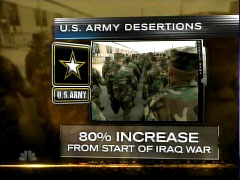 Catching up with news from the end of last week, NBC and CBS on Friday night jumped to highlight an increase in Army desertions blamed on the Iraq war, but failed to note the rate has simply returned to its 2001 level or that the number of desertions by Marines, a service also heavily committed to Iraq, has fallen. Brian Williams led the NBC Nightly News with how "the number of desertions from the U.S. Army is way up in the six years we've been at war." Jim Miklaszewski outlined how "over the past year, 4,698 soldiers were declared deserters. That's an alarming increase of 42 percent over the previous year, but a stunning 80 percent jump in desertions compared to the first year of fighting. As they did during the Vietnam War, many deserters flee to Canada to avoid a military court-martial in the U.S." Unlike Miklaszewski, CBS reporter David Martin added some perspective by pointing out that "the overall number of deserters represents less than one percent of soldiers on active duty. During the last unpopular war, Vietnam, the desertion rate was five percent."
Catching up with news from the end of last week, NBC and CBS on Friday night jumped to highlight an increase in Army desertions blamed on the Iraq war, but failed to note the rate has simply returned to its 2001 level or that the number of desertions by Marines, a service also heavily committed to Iraq, has fallen. Brian Williams led the NBC Nightly News with how "the number of desertions from the U.S. Army is way up in the six years we've been at war." Jim Miklaszewski outlined how "over the past year, 4,698 soldiers were declared deserters. That's an alarming increase of 42 percent over the previous year, but a stunning 80 percent jump in desertions compared to the first year of fighting. As they did during the Vietnam War, many deserters flee to Canada to avoid a military court-martial in the U.S." Unlike Miklaszewski, CBS reporter David Martin added some perspective by pointing out that "the overall number of deserters represents less than one percent of soldiers on active duty. During the last unpopular war, Vietnam, the desertion rate was five percent." 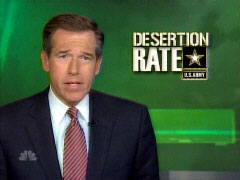 BRIAN WILLIAMS: Good evening. They are among the very best of America, those who raise their hands and volunteer to serve in this nation's wars in Iraq and Afghanistan. The deployments have been long, up to 15 months at a time away from home, and then some. And tonight, there is hard evidence that that time away and the tempo of battle are indeed taking their toll. The number of desertions from the U.S. Army is way up in the six years we've been at war. We begin tonight with our Pentagon correspondent Jim Miklaszewski who goes inside the numbers for us. Jim, good evening.
BRIAN WILLIAMS: Good evening. They are among the very best of America, those who raise their hands and volunteer to serve in this nation's wars in Iraq and Afghanistan. The deployments have been long, up to 15 months at a time away from home, and then some. And tonight, there is hard evidence that that time away and the tempo of battle are indeed taking their toll. The number of desertions from the U.S. Army is way up in the six years we've been at war. We begin tonight with our Pentagon correspondent Jim Miklaszewski who goes inside the numbers for us. Jim, good evening. 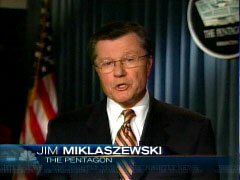 MIKLASZEWSKI: This week the Canadian Supreme Court refused to consider political asylum for two U.S. Army deserters, including Jeremy Heinzman, who opposes the war in Iraq.
MIKLASZEWSKI: This week the Canadian Supreme Court refused to consider political asylum for two U.S. Army deserters, including Jeremy Heinzman, who opposes the war in Iraq. 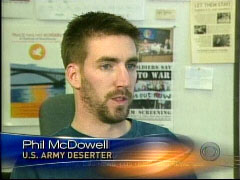 MCDOWELL: If I had been asked to go to Afghanistan, I would have gone there. But the Iraq War, I didn't want to have any part of that anymore.
MCDOWELL: If I had been asked to go to Afghanistan, I would have gone there. But the Iraq War, I didn't want to have any part of that anymore. 
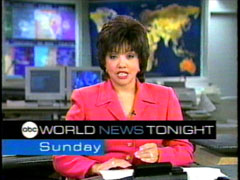 Former ABC News anchor Carole Simpson suggested she endorsed Hillary Clinton for President of the United States last month because she couldn't think of anything else to say when the Democratic candidate called on her at a political event. "I kept trying to get her attention," Simpson told the Boston Globe's Peter Schworm in a Monday article. "When I did, I realized I didn't have anything to say. I felt like a deer in headlights." So rather than tolerate a few seconds of uncomfortable silence, Simpson told Clinton: "I want to tell you tonight, because I happen to be here with my students, that I endorse you for President of the United States."
Former ABC News anchor Carole Simpson suggested she endorsed Hillary Clinton for President of the United States last month because she couldn't think of anything else to say when the Democratic candidate called on her at a political event. "I kept trying to get her attention," Simpson told the Boston Globe's Peter Schworm in a Monday article. "When I did, I realized I didn't have anything to say. I felt like a deer in headlights." So rather than tolerate a few seconds of uncomfortable silence, Simpson told Clinton: "I want to tell you tonight, because I happen to be here with my students, that I endorse you for President of the United States." 
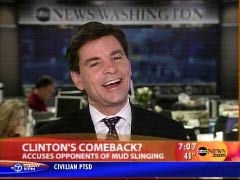 Liberal journalists George Stephanopoulos and Kate Snow spun ABC's coverage of Thursday's Democratic debate as a roaring comeback for Hillary Clinton and charitably described the 2008 contender's shifting position on the issue of driver's licenses for illegal immigrants. Reporting on Friday's Good Morning America, Snow disingenuously claimed that Clinton "simplified her opinion" on the matter and now opposes licenses.
Liberal journalists George Stephanopoulos and Kate Snow spun ABC's coverage of Thursday's Democratic debate as a roaring comeback for Hillary Clinton and charitably described the 2008 contender's shifting position on the issue of driver's licenses for illegal immigrants. Reporting on Friday's Good Morning America, Snow disingenuously claimed that Clinton "simplified her opinion" on the matter and now opposes licenses. 
 Surprisingly, CNN, during its Thursday night Democratic presidential debate in Las Vegas, asked a numbers of questions that conservatives might propose. During the first hour of the debate, moderators Wolf Blitzer, Campbell Brown, and John Roberts asked a total of 13 questions (not counting follow-up questions) on a number of issues. Of these, five could be considered to have come from the right, including illegal immigration, how teacher unions stifle efforts to improve schools and recognizing that "the surge" has improved conditions in Iraq.
Surprisingly, CNN, during its Thursday night Democratic presidential debate in Las Vegas, asked a numbers of questions that conservatives might propose. During the first hour of the debate, moderators Wolf Blitzer, Campbell Brown, and John Roberts asked a total of 13 questions (not counting follow-up questions) on a number of issues. Of these, five could be considered to have come from the right, including illegal immigration, how teacher unions stifle efforts to improve schools and recognizing that "the surge" has improved conditions in Iraq.
